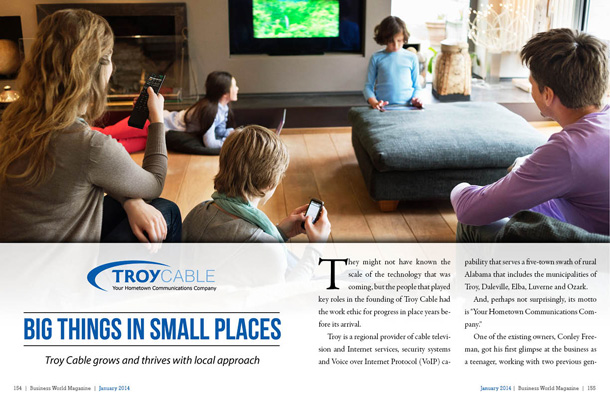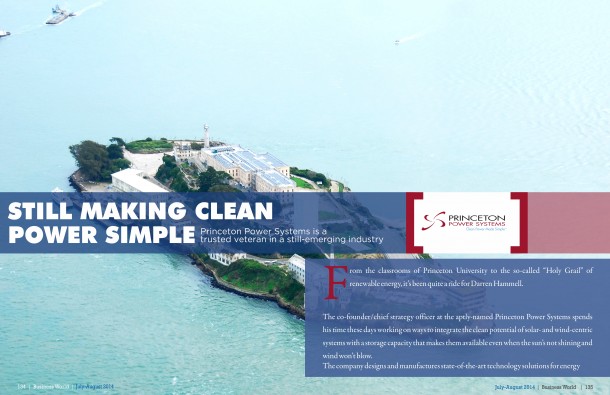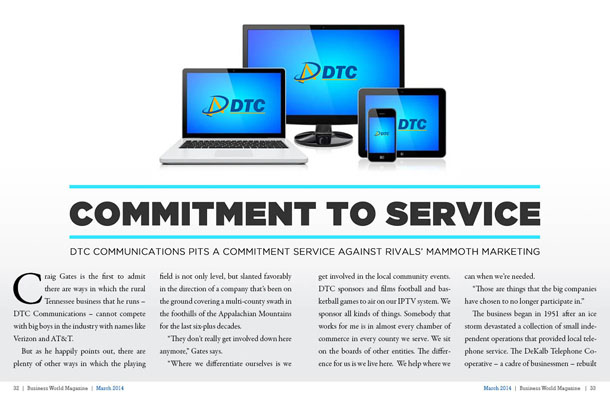
Big Things in Small Places

Troy Cablevision, Inc. grows and thrives with local approach
They might not have known the scale of the technology that was coming, but the people that played key roles in the founding of Troy Cablevision Inc. (Troy Cable) had the work ethic for progress in place years before its arrival.
Troy Cable is a regional provider of cable television and Internet services, security systems and Voice over Internet Protocol (VoIP) capability that serves a four-county swath of rural Alabama that includes Pike, Crenshaw, Coffee and Dale.
And, perhaps not surprisingly, its motto is “Your Hometown Communications Company.”
Chief Technical Officer Conley Freeman got his first glimpse at the business as a teenager, working with two previous generations of the family and getting a practical look at how things were done.
“I started working here, really before I could legally get paid, starting around 14 years old, being an installer, installing cable TV,†he says. “Having the privilege to work with my grandfather really instilled a lot of values in my dad and myself, and, because of that, the people that work in this organization.
“For example, if a customer were to come in and want service, they would get installed the same day. My grandfather was up working the lines in a bucket truck several weeks before he passed away. He was always out working, always taking care of the customers. He would even throw a ladder in the back of his Mercedes-Benz, just to go hook them up.
“Taking care of the customer was definitely the No. 1 priority, back then as it is today.â€
BUILDING IT OUT
These days, Troy possesses the largest fiber-to-home and fiber to business deployment in Alabama, a footprint it’s still committed to growing. And while the company name still reflects back to its simpler beginnings, it now brands itself a high-tech company that’s not at all married to a single technology.
The ideal technology, in fact, is one that enables innovation, is reliable and is going to allow the business to continue to thrive in the future, and there’s no hesitation in going all-in on processes now that may not prove fully operational and lucrative for years to come.
“My dad’s philosophy has always been diversification. Our model is built on recurring revenue,†Freeman says. “There are technologies and products and services – dial-up for instance, we were in the dial-up business so that we could provide our customers with access before we were in the cable modem business – but we knew that we needed another product that would allow us to continue to grow through the decline in the dial-up business.
“As dial-up hit its peak and started to fall, we had out next level of service that we could offer, which was the DOCSIS cable modem. The cable modem is a great residential technology, but it was never a business-class technology in our mind, so we’ve always rolled out fiber to the business.â€
Troy was awarded $26.1 million in federal stimulus funds in 2010 to build a middle-mile fiber-optical broadband network connecting Pike, Coffee, Crenshaw and Dale counties to the Internet POP points in Montgomery and Dothan, Ala. The Southeast Alabama SmartBand initiative calls for 595 miles of fiber.
The company already belongs to a public/private partnership with the South Alabama Electrical Cooperative for an effort to enable smart-grid energy management services for the co-ops’s 17,000 electric customers in Pike, Coffee and Crenshaw counties – an initiative that will include two backhaul routes to Atlanta, which could boost connectivity and attract economic development to the area.
NEW WAYS TO HELP
In addition to the economic development angle, the enhanced grid simultaneously augments advances in education and public safety by providing enhanced network capability to schools and public service professionals – and bettering the quality of life for all who are touched by those services.
“And tele-medicine, we’re enabling these rural areas to get access to specialists via video conferencing mechanisms,†Freeman says. “The foundation we’re laying really allows for this new augmented reality that we’re going to see in the near future where a doctor can operate on a patient and not only see them through the camera, but actually feel as if they’re in the same room.
“I know that’s kind of sci-fi, but that’s what this network enables. It enables the things we thought were only science fiction. It allows them to become reality very quickly.â€
Another challenge of modern life, he says, is being able to serve all levels of customers – from individual residents to companies with far-flung business interests – and the increasing desire for those who provide the networks that transport the complicated documents, images and media content.
FACING THE FUTURE
To be sure, it’s not simply about making phone calls anymore.
“I used to have a separate voice network. I used to have a separate data network, a separate video network,†he says. “Now all of those things converge onto one common platform, so you may have a data communication, but at the same time it has voice with it. The fax machine was a great technology, but when it first started out it wasn’t very valuable because not many people had fax machines. But as fax machines started to propagate out and everyone had one, the value of that fax machine went up.
“Now that you’ve got this converged platform that’s ubiquitous and that anybody can use just as long as they have a compatible application, it opens up a tremendous amount of future opportunities. Definitely the demand for the data network is going up, but that doesn’t mean people are making less telephone calls or communicating less via the telephone, they’re just doing it in a different way.â€
As the company girds itself for the future, among its main objectives – even in an industry where the pace of change remains remarkably rapid – is to maintain the small-town, local feel that its customers in rural Alabama have come to expect and enjoy. Freeman has five kids, and his 9-year-old has already begun to show interest in what dad does for a living.
“We’re able to make the world a little smaller,†he says. “Somebody that doesn’t want to live in a big city, they’re able to work and be productive here and have the tools and technology they need to be able to communicate with the rest of the world.
“Our network is really just idling right now, there’s still room for growth.â€
And as it grows, Freeman’s grandfather remains as a foundational piece.
“That’s kind of what we feel like we’ve built here – something that all of our family members and employees can benefit from,†he says. “One of the biggest things my father says is ‘Our employees show up as liabilities on the books, but are truly assets.’ We want to take care of our community, our employees, and our families.â€







